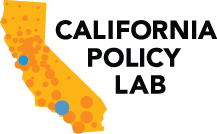- By:
- Category:

NEARLY 1 IN 2 WORKERS WITH A HIGH SCHOOL EDUCATION OR LESS HAVE FILED FOR UNEMPLOYMENT INSURANCE SINCE MARCH
Sacramento, May 7 2020–– A new analysis of initial Unemployment Insurance (UI) claims filed in California by the California Policy Lab at UCLA and the Labor Market Information Division at the California Employment Development Department provides an updated look at how the COVID-19 crisis is impacting various types of workers, industries and regions throughout California based on initial UI claims filed through April 25th.
“In our latest analysis of initial UI claims in California, we found almost half of all workers who have a high school degree or less have filed for unemployment benefits in California since this crisis began – that exceeds levels seen during the Great Depression” explains Till von Wachter, a co-author of the analysis, UCLA economics professor and faculty director at the California Policy Lab. “We also found that the share of initial UI claims filed by Asian workers has increased during the crisis relative to other racial and ethnic groups, especially in the Accommodation and Food Services and in Health Care and Social Assistance industries.”
New this week: Building on last week’s analysis, this new analysis adds two weeks of UI data (through April 25th); adds data on self-reported race and ethnicity of UI filers; and includes data on UI claims by industry for the 20 California counties with the largest labor force.
Key research findings:
•80% of initial claimants report they expect to be recalled to their prior job, down from 90% at the peak of the crisis, and a substantial increase from 40% who had this expectation before the crisis.
•All races and ethnicities were affected by the crisis, but the share of Asian claimants experienced an increase in the share of initial claims, particularly among Accommodation and Food Services and Health Care/ Social Assistance Services.
•The fraction of the labor force that filed initial UI claims since mid-March rose to 18.8% statewide, to 45% for less educated workers, and to 30% for workers in their early 20s.
•The number of initial claims has declined for three consecutive weeks, but claims in the week ending April 25th were still eight times the pre-crisis average in February.
•The decline in claims occurred among all groups of the labor force. While the share of lower-educated workers has returned to pre-crisis levels, initial UI claimants are still disproportionately younger, female, and lower-income.
•While there are important similarities in the effect of the crisis across counties in California, industries in certain counties were more affected than others.
This analysis will be updated on a bi-weekly basis with new data on initial Unemployment Insurance claims to provide a timely and detailed analysis of the impacts of COVID-19 on California’s labor market.
Methodology
The analysis is based on comparing initial unemployment insurance claims in February 2020 (before the COVID-19 crisis impacted the labor markets); the start of the employment crisis in mid-March (when initial UI claims increased dramatically); and more recently the first 25 days of April.
The analysis complements traditional survey-based indicators on the labor market, which have detailed information but large time lags and lower frequency, and to weekly publications of the number of total UI claims, which have minimal time lags but which lack the detail available in this analysis
###
The California Policy Lab creates data-driven insights for the public good. Our mission is to partner with California’s state and local governments to generate scientific evidence that solves California’s most urgent problems, including homelessness, poverty, crime, and education inequality. We facilitate close working partnerships between policymakers and researchers at the University of California to help evaluate and improve public programs through empirical research and technical assistance.
The Labor Market Information Division (LMID) is the official source for California Labor Market Information. The LMID promotes California’s economic health by providing information to help people understand California’s economy and make informed labor market choices. We collect, analyze, and publish statistical data and reports on California’s labor force, industries, occupations, employment projections, wages and other important labor market and economic data.
